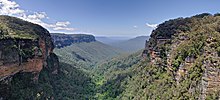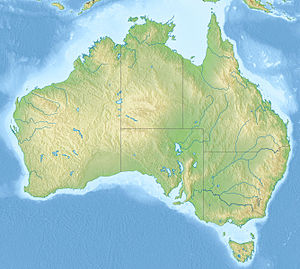Greater Blue Mountains Area
| Greater Blue Mountains Area | |
|---|---|
| Name as inscribed on the World Heritage List | |

A view over Jamison Valley, in 2008.
|
|
| Location | Blue Mountains region, New South Wales, Australia |
| Type | Natural |
| Criteria | ix, x |
| Reference | 917 |
| UNESCO region | Asia-Pacific |
| Coordinates | 33°42′S 150°0′E / 33.700°S 150.000°ECoordinates: 33°42′S 150°0′E / 33.700°S 150.000°E |
| Inscription history | |
| Inscription | 2000 (24th Session) |
|
Location of the Blue Mountains on the Australian continent
|
|
The Greater Blue Mountains Area is a World Heritage Site in the Blue Mountains of New South Wales, Australia. The 1,032,649-hectare (2,551,730-acre) area was inscribed on the World Heritage List at the 24th Session of the World Heritage Committee, held in Cairns in 2000 with the following inscription:
This area is one of rugged tablelands, sheer cliffs, deep, inaccessible valleys and rivers and lakes teeming with life. The rare plants and animals that live in this natural place relate an extraordinary story of Australia's antiquity, its diversity of life. This is the story of the evolution of Australia's unique eucalypt vegetation and its associated communities, plants and animals.
The Greater Blue Mountains Area consists of 10,300 square kilometres (4,000 sq mi) of mostly forested landscape on a sandstone plateau 60 to 180 kilometres (37 to 112 mi) inland from the Sydney central business district. The area includes vast expanses of wilderness and is equivalent in area to almost one third of Belgium, or twice the size of Brunei.
The area is called "Blue Mountains" based on the fact that when atmospheric temperature rise, the essential oil of various eucalyptus species evaporates and disperse in the air, then visible blue spectrum of sunlight propagates more than other colours. Therefore, the reflected landscape from mountains seems bluish by human eyes.
...
Wikipedia

